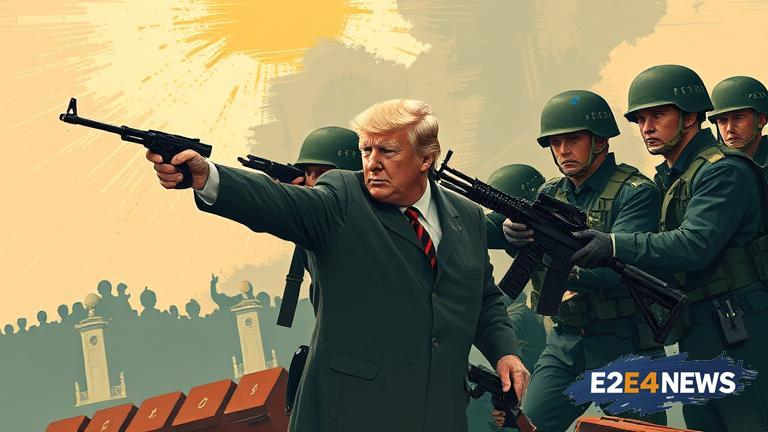The recent deployment of military personnel to various parts of the country has raised concerns about the normalization of military occupation. Critics argue that this tactic is a threat to democracy and an erosion of civil liberties. The use of military force to quell civilian unrest and protests has been a hallmark of authoritarian regimes, and many fear that the Trump administration is following in these footsteps. The deployment of troops to the southern border, for example, has been widely criticized as an overreach of executive power. The militarization of the border has also led to the detention of thousands of migrants, many of whom are fleeing violence and persecution in their home countries. The conditions in these detention centers have been described as inhumane, with reports of overcrowding, poor sanitation, and inadequate access to food and water. The use of military personnel to enforce immigration policies has also raised concerns about the role of the military in domestic law enforcement. The Posse Comitatus Act, which prohibits the use of military personnel for domestic law enforcement, has been cited as a potential obstacle to the administration’s plans. However, the Trump administration has argued that the deployment of troops is necessary to maintain national security and protect American citizens. The administration has also pointed to the success of military occupation tactics in other countries, such as Iraq and Afghanistan, as evidence of their effectiveness. However, many experts argue that these examples are not relevant to the current situation, and that the use of military force in domestic contexts is a fundamentally different issue. The normalization of military occupation tactics has also been criticized for its potential to undermine trust in institutions and erode civil liberties. The use of military personnel to surveil and monitor civilian populations has been described as a form of ‘soft’ repression, which can have a chilling effect on free speech and assembly. The deployment of troops to urban areas has also raised concerns about the potential for violence and human rights abuses. The use of military force to quell protests and unrest has been linked to a range of human rights violations, including excessive use of force, arbitrary detention, and torture. The Trump administration’s use of military occupation tactics has also been criticized for its potential to exacerbate existing social and economic inequalities. The deployment of troops to areas with high levels of poverty and unemployment has been described as a form of ‘militarized’ social control, which can perpetuate cycles of violence and deprivation. The use of military personnel to enforce immigration policies has also been criticized for its potential to perpetuate racist and xenophobic attitudes. The Trump administration’s rhetoric on immigration has been widely criticized as divisive and inflammatory, and many argue that the use of military force to enforce immigration policies is a form of ‘state-sponsored’ violence. The normalization of military occupation tactics has also been criticized for its potential to undermine international human rights law. The use of military force to quell protests and unrest has been linked to a range of human rights violations, including the right to life, liberty, and security of person. The Trump administration’s use of military occupation tactics has also been criticized for its potential to erode global stability and security. The deployment of troops to areas with high levels of conflict and instability has been described as a form of ‘militarized’ diplomacy, which can perpetuate cycles of violence and aggression. The use of military personnel to enforce immigration policies has also been criticized for its potential to perpetuate a ‘security-first’ approach to international relations, which can undermine cooperation and diplomacy. The Trump administration’s use of military occupation tactics has also been criticized for its potential to undermine the rule of law and the principles of democracy. The deployment of troops to areas with high levels of corruption and impunity has been described as a form of ‘militarized’ governance, which can perpetuate cycles of violence and abuse. The use of military personnel to enforce immigration policies has also been criticized for its potential to perpetuate a ‘culture of fear’ and ‘culture of impunity’, which can undermine trust in institutions and erode civil liberties.
